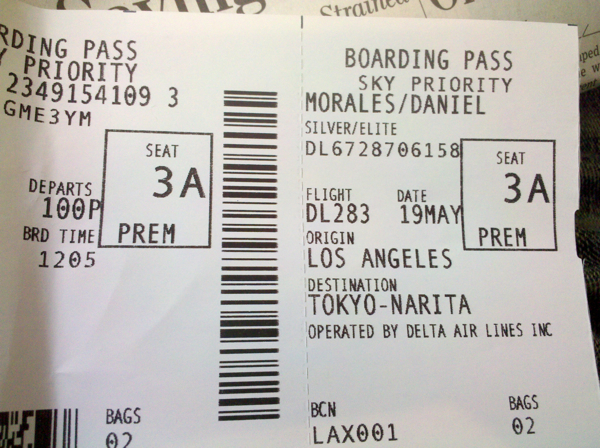
I have what my mother has described as “follow through issues.” No, this has nothing to do with my golf swing or the form of my jumpshot. I always find it easy to start big projects, but sometimes completing them can be an issue, and when something is a tedious task, I have trouble even getting started.
Schoolwork was never an issue, and real work hasn’t been either, but favors for friends and the little unimportant things like laundry, cleaning house, etc. always take me several tries. I’m almost never able to complete them in one go. I also find it hard to keep a budget and deal with number-based stuff. This includes joining an airline mileage program and racking up miles.
But I have seen the promised land, friends, and its name is first class on a transpacific flight. Yes, I was upgraded to first class on a LAX-NRT Delta flight when I flew in two months ago.
I’m not sure what your impression of the upgrade process is like, but I always imagined people in suits schmoozing their way from economy to business class or business to first. Well, this is a lie. The best way to get free upgrades to first class is to pick an airline, commit to it over the long term, and build up miles in the mileage plan. I wasted three years on JET by flirting with several different airlines (always the cheapest and most convenient), but not long after I moved to Tokyo, I committed to a long term relationship with Delta, and that’s been the secret. Delta has been a love-hate relationship, but she’s made up for her wrongs.
If you work long term in Japan, chances are you were like me and went home about once a year for a week or two. Tokyo to New Orleans is about 5000-6000 miles for each leg. That’s 10-12,000 miles per trip, and if you happen to take two trips in the same year, you can get close to the 25,000 miles required for Silver Medallion status.
I don’t care what Delta says, that Silver Medallion status is GOLD. Once you’re in to the medallion club, you get unlimited free upgrade requests. I’m not exactly sure if this is true for international flights, but when you purchase a domestic ticket, it will show you that your upgrade has been requested. I imagine that this enables the airline to sell more economy fares in the event that the first class fares don’t sell out; they simply bump a medallion member to first class and sell another (probably more expensive) ticket to Joe Schmoe (because he had to buy last minute).
Since last December, I’ve been upgraded to first class on four out of five domestic flights. For mathematically disadvantaged individuals, that’s 80%.
Most of these were short, one-hour flights, so the only real advantage was being first on and first off the plane. The MSY(New Orleans)-LAX flight was longer, so I got breakfast, which was great. The flight attendant came up to me and asked, “Will you be joining us for breakfast?” which absolutely killed me. Worth the price of admission to get Japanese-style attention in the U.S.
I don’t know how many of you have flown through LAX recently, but it’s a crap airport. Because of the construction and lack of speakers, I didn’t know I’d been upgraded to first class to Tokyo until shortly before I boarded. I got an email a few days before the MSY-LAX flight telling me I’d been upgraded, but the lady at the gate in LAX handed me my upgraded boarding pass a few minutes before I boarded. I didn’t have to ask for anything. It was automatic. Again, my guess is that this is because folks were flying standby and there were open seats in first class, and they start going down the list of people in the following order – medallion status, number of miles flown, price paid for ticket.
First class was great. I was used to economy where food isn’t served until an hour or two into the flight, so I had a meal at LAX before I left. Appropriately, my last American meal looked like a big, fat zit – clam chowder in a bread bowl:
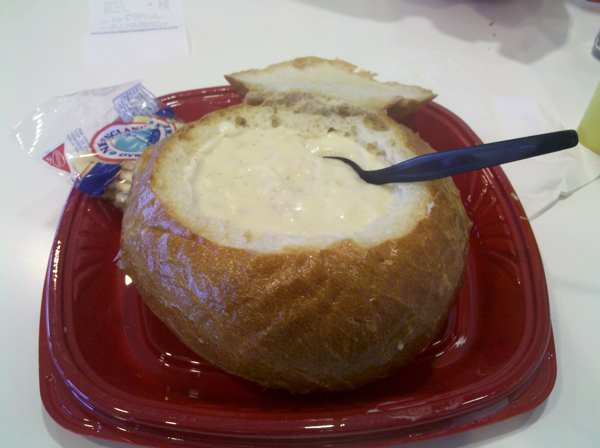
In first class, they feed you immediately, and they take your order before take off. I only took pictures of the food, and this is what it looked like:
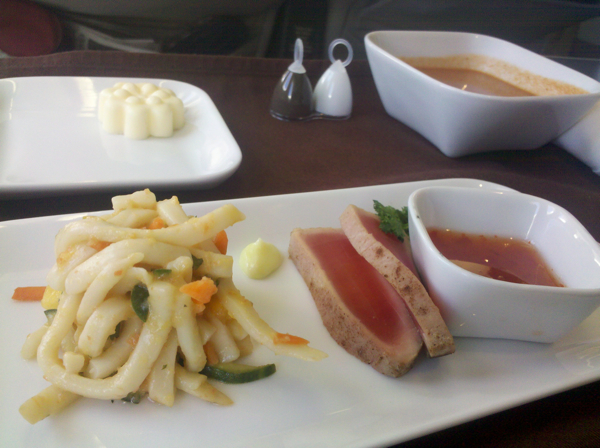

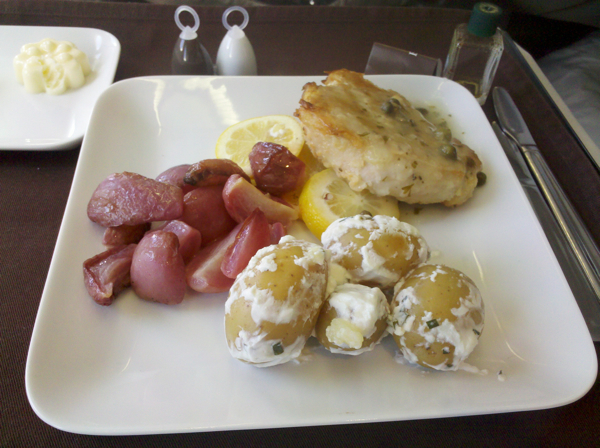
After we finished the meal, they brought out a dessert tray and started with the seats across from me. The desserts slowly started to disappear, so I resolved to go without the ice cream I wanted until another dessert tray appeared in my peripheral vision.
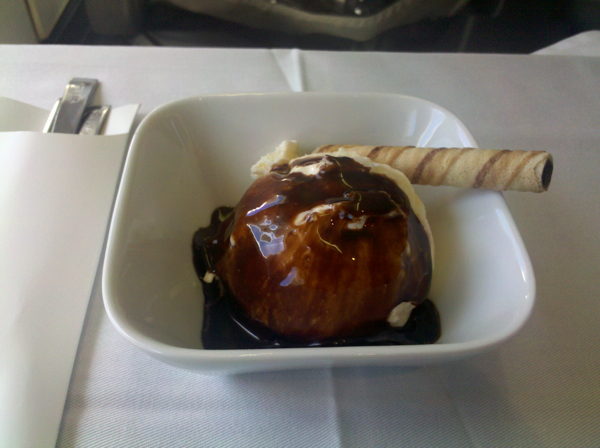
Cue tryptophan dream sequence. Wake up, breakfast like a boss:
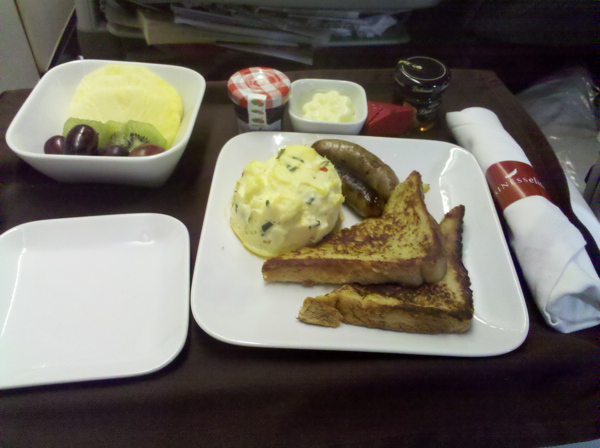
The secret is, as mentioned before, committing to an airline, building up miles, and being a little lucky. I had a little luck myself. On my way home to Japan from the U.S. last year, my flight got canceled because the toilet was broken, so they put us all in a hotel for the night and gave us 25,000 miles on vouchers. Later they gave us an additional 10,000 miles just to apologize. I think these are what really helped bump me to medallion status, but flying a bunch of times didn’t hurt either.
A couple other notes:
– Book your ticket directly through Delta.com. Tickets booked via miles or a travel agent probably won’t be upgraded because they are special fares. Booking online probably won’t cost much more.
– Ask for the upgrade over the phone before the flight. I feel like this would probably improve your chances more than asking someone at the gate. Those gate people always seem to be incredibly stressed out. I’m not sure the people on the phone are any less stressed, so this might be the best idea.
– Enjoy the hell out of your first class experience! At first I was all self-concious, telling myself “Be cool, bitch!” but then I relaxed and said fuck it, I’m going to enjoy the hell out of this. I pressed all the buttons on the seat (there are a ton) until I figured them all out, despite the fact that it made me look like an idiot. I took pictures of all the food. I watched movies. I cracked some beers.
– Don’t get drunk and be obnoxious like the lady in front of me. She had something like five or six glasses of wine and then went on a toilet rampage. I waited for one to open and went in to brush my teeth and relieve myself. I had taken a little time, so when I heard a knock on the door, I assumed it was the flight attendant. I quickly finished and apologized when I got out. The flight attendant said, “Don’t be sorry” and rolled his eyes at the lady who was wasted and pounding on the bathroom doors.
– Always wear a jacket or something you can check just in case you get upgraded. They hang it up in a closet for you!
– I’m flying home in a week. I’m not expecting to get upgraded (because the service in Japan is horrible, according to some terrible documentary film asshole), but it would be a nice surprise. I’ll keep everyone posted.









